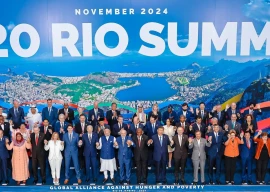
The armed forces overthrew President Mohamed Mursi on Wednesday, declaring that he had ‘failed’ the Egyptian people.
A poor farm boy from the Nile Delta, made good through an American education and pious loyalty to the underground Muslim Brotherhood, Mursi was shoved blinking from obscurity a year ago to become Egypt’s first freely elected president.
Taking on a role that the Brotherhood had feared might be a trap sprung by a hostile bureaucracy inherited from the old regime, Mursi’s personal ratings were sapped by an economy in free fall and one clumsy policy move after another.
He was fatally undermined by his failure to shake a conviction among the talkative urban elites that he was the clownish pawn of a secret society of religious zealots.
When, in January, he ventured a few words in English during a visit to Germany, he presented himself as a perfect fall-guy for a new breed of political comic wowing television audiences with the freedoms won in the revolution on Tahrir two years ago.
“Gas and alcohol don’t mix,” the teetotal Muslim engineer told a bemused Berlin audience, his English stilted and tapping the table for emphasis to make a point about road safety.
The clip, as mocked by a satirist on prime-time TV, went viral on social media among Egypt’s anglophone liberal elite.
When the show’s host Bassem Youssef, who revels in being ‘Egypt’s Jon Stewart’, was hauled in for questioning for insulting the president, the joke just grew.
When someone first wrote “Egypt and Mursi don’t mix!” on a placard, the slogan took off; soon millions were in the streets and a beleaguered Mursi was left fuming in rambling speeches about the personal iniquities heaped on him by the media. Samer Shehata, an expert on Arab politics at Oklahoma University, summed up the dilemma Mursi’s fate has exposed in Egypt, where liberals are celebrating the military toppling a democratically elected leader: “Its politics are dominated by democrats who are not liberals and liberals who are not democrats,” Shehata wrote in the New York Times.
Mistakes
Mursi and his allies in the Brotherhood’s Guidance Council - Egypt’s liberals called them his puppeteers - also made mistakes: “He has been a disastrous leader,” Shehata said.
“Divisive, incompetent, heavy-handed and deaf to wide segments of Egyptian society who do not share his Islamist vision.”
Broken promises on the economy in particular, where people have suffered shrinking real incomes and lengthening lines for fuel, widened the appeal of a protest movement rooted in a liberal opposition that repeatedly lost elections to Islamists.
“Mursi has alienated the other forces, he didn’t handle the economy well and he made many enemies - in the courts, in the army, the police, the media,” said Khalil al Anani, a senior fellow at Washington’s Middle East Institute currently in Cairo.
Highlighting the ‘media warfare’, he added: “He was fighting on many fronts at the same time and that is always a very bad political tactic. He united the opposition against him.”
As hopes for consensus faded, Mursi ploughed on regardless, casting his opponents as bad losers who spurned his outstretched hand. His allies, meanwhile, were whittled down to Islamists at the extreme religious right.
Mursi defended his legitimacy as an elected leader in a keynote speech last week before an invited audience of cheering supporters, after a first warning from the army to embrace his opponents. Broadcast live on national television for nearly three hours, it was a mark of a stubborn failure to understand how to communicate beyond the Brotherhood’s electoral base.
“He knows his primary audience is not opposition supporters or secular-minded urbanites,” the International Crisis Group’s Yasser El Shimy said of Mursi’s attempt at a new, folksy style.
Isolation
Mursi, 61, is a civil engineer and lecturer with a doctorate from the University of Southern California. He was raised in a poor farming village a two-hour drive north of Cairo.
Thrust into the presidential race when the Brotherhood’s first-choice candidate was disqualified, he was dismissed at first as the “spare tyre” but did in time grow in confidence.
The novice president stunned Egyptians in August when he sacked Hosni Mubarak’s defence minister, a move that drew grudging respect from some critics, even in the liberal camp.
Visits to China and Iran set a new tone for Egypt’s foreign policy. Brokering an end to a short war between Israel and the Palestinian group Hamas won him kudos from Washington and reassured the West that Islamist rule would not end a regional order underpinned by Egypt’s 1979 peace treaty with Israel.
Yet no sooner had Mursi helped settle that international conflict than he set off another one at home. A decree allowed the Islamists to complete a constitution free of the risk of legal challenges. Mursi then put the controversial text to referendum, ignoring violent protests. He won, but at a high cost.
As his circle of friends tightened to the likes of the former armed jihadis of al-Gamaa al-Islamiya, Mursi found it ever harder to convince critics they could trust him.
Worried about alienating hardliners with his outreach to Iran, last month he joined a gathering of sectarian radicals calling for ‘jihad’ in Syria - a move that may have fatally undermined the loyalty of Abdel Fattah al-Sisi, the pious, US-trained general Mursi made head of the armed forces.
Adventurism abroad and economic mismanagement at home fueled opposition with the military and the wider public, said Imad El Anis, at Nottingham Trent University. But, most importantly, Mursi “understood democracy as only being about elections”.
He simply ignored tens of millions who did not vote for him.
This week, General Sisi listened to them and agreed with the jokers. Mursi and Egypt simply did not mix, he decreed.
Published in The Express Tribune, July 4th, 2013.
COMMENTS (18)
Comments are moderated and generally will be posted if they are on-topic and not abusive.
For more information, please see our Comments FAQ




1730959638-0/trump-(19)1730959638-0-165x106.webp)

1732428810-0/Copy-of-Untitled-(3)1732428810-0-270x192.webp)
1732425487-0/BeFunk_§_]__-(42)1732425487-0.jpg)









We need to build more hydroelectric projects, as soon as possible. Explore other river sources as well, including Kunar and Chitral.
Everything is happening according to someone's game plan. Guess who's game plan?
@Pervaiz Lodhie:
Majority that chose Nawaz Sharif does not have facebook accounts. Those guys voted for PTI.
So the Egypt army saved its people from a fanatic regime which was backing militants against the liberal and progressive Egyptians.
Looks like Egypt's military is just carrying out the wishes of the Egyptian people. What is happening in Egypt is a good example for the new leadership in Pakistan. People are utterly frustrated and angry after 5 years of ruination of everything. I have no doubt that 18 million Pakistanis are watching on what is promised and what is done. Any games to fool the people will not work anymore. Clock is ticking to show results.
Morsi was given sufficient opportunity by the people of Egypt who elected him. Clearly time for civilian or military dictatorships is gone. People are empowered with their cell phones and social media to keep the leaders honest and subservient to the people and their wishes. This is an important lesson for new PM Nawaz Sharif and his team to perform as promised. No more games would be accepted.
I think this is the way to go, democracy and that too with incompetent people doesn't suit us. The only developement our country has seen has been in eras of Gen Ayub and Gen Musharraf, our politicians have only ruined whatever they had built.
General Nasir,then other General,followed 3rd one from Armed forces, now finally 4th genral in round about 60 years of Egyptian History. All the time defeated by Israil.
Mursi's biggest sin was not toe with US-Israel-Saudi policies.
Seems to be ET is very excited with this news.
The ouster of an elected leader should not be celebrated in a manner as witnessed in some circles. Look at the headline of this paper?? President Mursi was freely elected and so was his parliament, which was not allowed to be functional by the remnant judiciary of the Mubarak era (like PCO judges). What did these elements expected from Mursi, to clean up the mess of army dictators of 60 years, in just one year, with his hands tied by the army establishment and clones of Mubarak. Is it just a coincident that the Egyptian coup leader spoke with U.S. Secretary of Defense just two days ago? What will happen next? Will Egypt adopt a system where every President shall be removed by mobocracy on the streets, i.e., instead of elections? With the constitution gone (which was approved by the Egyptian people in a referendum), the elected President and parliament gone, Egypt has reverted back to the army age. Egypt is doomed. The people of Egypt have shot themselves in the foot.
Strange..! All thts happening in Egypt izz gud for nothing..! They must hv patience nd thiz government must have been given sumtime....
Morsi had his own party's agenda and didn't care about the economy.
Like Nawaz Sharif but he doesn't have a party agenda but more of a personal agenda.
Good riddance. There should be no place for radical religious minded people in politics.
should have happened to the total failure zardari here too.
Well done Egypt.
finally some good news from muslim world where people rejects extremest fatwa machine and american puppet morsi. Pakistani should learn lesson from egypt where more then 50 thousands people killed by terrorists, peoples lost their father , brother uncle and still they want to negotiate with the killers.
Let's put somethings in perspective here.
The unemployment rate under Muhammad Morsi is around 13%, up from 9% under Hosni Mubarak. Debt payments have grown from $5 billion to $8 billion a year, while inflation is up from 3% before the revolution to 13% to 18% now. Reserves declined from $34 billion before the revolution to about $16 billion. Assaults against minorities and women are up. Tourism - biggest share of the GDP - is down.So Egypt Oust a Dictator then elects leader then ousts elected to welcome a dictator again. Way to go ,,,